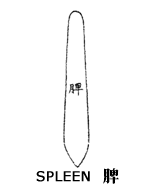 Spleen from a TCM Perspective Spleen from a TCM Perspective
In western physiology, the spleen is a large, vascular, lymphatic organ. It acts as a reservoir and filters the blood. It also plays a role in making blood early on in life. In TCM, the spleen does not perform these functions. It assists with digestion, blood coagulation and fluid metabolism in the body.
"The spleen rules transformation and transportation."
Since the spleen is the primary organ responsible for digestion, its main function is to transform food into essence used for qi and blood transformation. Once the ingested food and liquids get into the body, the spleen extracts a pure nutritive essence from them. This pure nutritive essence is used for the production of qi, blood and body fluids, which the spleen then transports throughout the body. Liquids extracted as pure nutritive essence are sent upwards to the lung for dissemination and redistribution. However, some will descend to the kidney and bladder to be excreted as urine.
If the transformation and transportation functions of the spleen are harmonious, there will be abundant nutritive essence for qi and blood, but if the spleen is in disharmony, its digestive powers will be affected. As a result, abdominal distention, pain, diarrhea or malaise occurs.
"The spleen rules ascending pure essence."
After transforming food into nutritive essence, the spleen sends it upwards to the heart and lungs where it is transformed into qi and blood for nourishment of the whole body. Food not transformed into nutritive essence becomes an impure substance. While the spleen ascends pure essence, the stomach, (the spleen's corresponding exterior organ), will descend the impure substances inside the digestive tract. By ascending the pure nutritive essence and descending the impure substances, a balance in the digestive system is created.
"The spleen governs the blood."
Not only does the spleen transform food essence, it also governs the movement of blood by keeping it flowing in its proper pathways in the blood vessels. When spleen qi is sufficient, there is adequate production of qi and blood, and blood is, therefore, kept inside the blood vessels. If the spleen's functions are in disharmony, the blood escapes from its normal pathways, leading to symptoms such as bloody vomit, blood in the stool, blood under the skin, blood in urine, or menorrhagia (excessive menstrual bleeding).
"The spleen rules the muscles and flesh. It opens into the mouth and its brilliance is manifested in the lips."
In TCM, the movements of the muscles and the four limbs depend on the power of the spleen. When spleen qi is sufficient, the limbs and muscles are healthy and strong because they are nourished by the blood and qi. If spleen qi is deficient, however, the muscles become weak and an individual may feel tired and have general malaise.
The lips and mouth are also affected by the spleen's health. If spleen function is harmonious, the mouth can distinguish the five tastes (sweet, salty, sour, bitter and pungent (spicy)), and the lips appear red and moist. If the spleen is weak, the mouth cannot distinguish the different tastes and the lips will be pale.
Click here to read more about the Spleen Meridian.
|